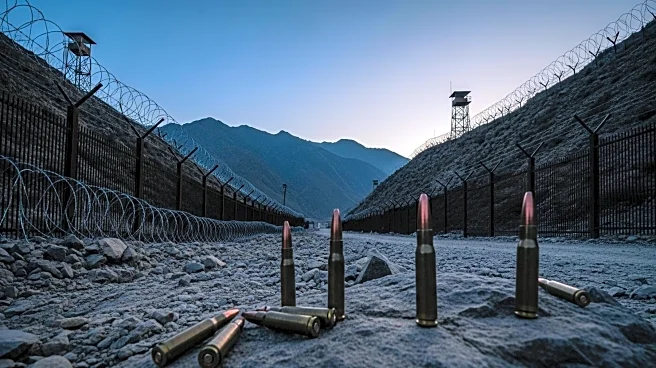What's Happening?
Afghanistan announced that it killed 58 Pakistani soldiers during overnight operations along the border, citing repeated violations of its territory and airspace by Pakistan. The Taliban government claims to have captured 25 Pakistani army posts, with 30 soldiers wounded. Pakistan, however, reported lower casualties, stating 23 troops were killed. The clashes occurred in the Zazai Maidan district of Khost province, Afghanistan. The Taliban's Defense Ministry emphasized its readiness to defend Afghanistan's borders against further violations. The Torkham and Chaman crossings, key trade routes between the two countries, were closed due to security concerns. Pakistan accuses Afghanistan of harboring militants from the banned Tehreek-i-Taliban Pakistan group, which Kabul denies.
Why It's Important?
The border clashes between Afghanistan and Pakistan could exacerbate regional instability, especially given the recent tensions between India and Pakistan over Kashmir. The situation highlights the fragile security dynamics in South Asia, where cross-border militancy and territorial disputes remain prevalent. The closure of trade routes impacts economic activities and affects Afghan refugees attempting to leave Pakistan. The conflict also draws attention to the geopolitical interests of regional powers, with India strengthening ties with Afghanistan's Taliban government. Calls for restraint from Saudi Arabia and Qatar underscore the international concern over potential escalation.
What's Next?
The situation may lead to further diplomatic engagements as regional powers seek to de-escalate tensions. Afghanistan's Taliban government has expressed willingness for peaceful resolution but remains prepared for military responses if necessary. Pakistan's condemnation of the attack and its military response indicate a potential for continued hostilities. The international community, including Gulf states, may increase diplomatic pressure on both countries to engage in dialogue. The closure of border crossings could persist, affecting trade and movement between Afghanistan and Pakistan.
Beyond the Headlines
The conflict raises questions about the legitimacy of the Durand Line, the border between Afghanistan and Pakistan, which Afghanistan has never recognized. The historical context of territorial disputes and cross-border militancy adds complexity to the current situation. The involvement of regional powers like India and Saudi Arabia reflects broader geopolitical interests in South Asia. The humanitarian impact on civilians, particularly refugees, highlights the need for international attention to human rights and security in the region.










